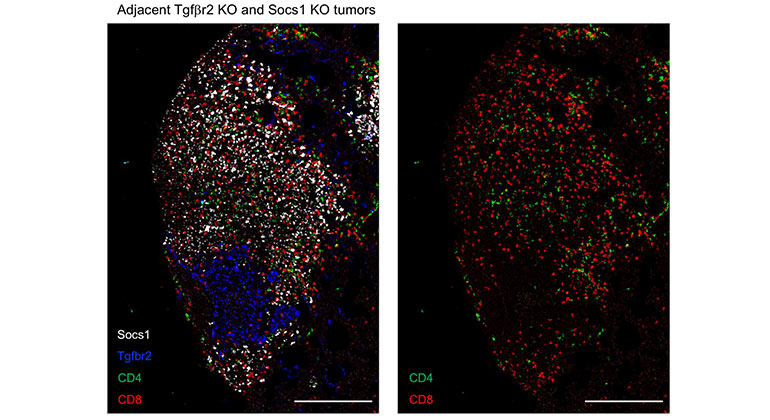Mount Sinai Researchers Identify 20 Novel Gene Associations With Bipolar Disorder
In the largest study of its kind, involving more than 50,000 subjects in 14 countries, researchers at the Icahn School of Medicine at Mount Sinai and more than 200 collaborating institutions have identified 20 new genetic associations with one of the most prevalent and elusive mental illnesses of our time—bipolar disorder. The study is reported in the May 2019 issue of Nature Genetics.
The elevated morbidity and mortality associated with bipolar disorder make it a major public health problem and leading contributor to the global burden of disease. The identification of genes associated with it can help identify therapeutic targets for treatment and prevention.
Bipolar disorder, a neuropsychiatric condition characterized by dramatic shifts in a person’s mood, affects approximately 60 million people globally, 10 million of them in the United States. Unlike other illnesses, bipolar disorder has been found to affect men, women, and people of all ethnic groups equally. While genetic and environmental factors have been demonstrated to play a role in the illness, the exact cause of bipolar disorder remains unknown.
To identify genes associated with the disorder, researchers conducted a genome-wide association study (GWAS)—a study type used to look for differences in the genetic code that are associated with a particular trait, such as having a mental illness. While some of the study findings reinforced hypotheses regarding the neurobiology of the disease—for example, its high heritability as previously demonstrated in twin studies—the study also demonstrates new biological insights. The study was initiated by the late Pamela Sklar, MD, PhD, who was Chief of the Division of Psychiatric Genomics at Mount Sinai.
In examining the genetic relationships between bipolar disorder and other psychiatric illnesses, the researchers discovered that eight of the genes they found to be associated with bipolar disorder harbored schizophrenia associations as well. Depression, in addition to other psychiatric-relevant traits such as autism spectrum disorder and anorexia nervosa, was also found to have genetic ties to the disorder.
“The crux of this international collaborative study was, in essence, to connect the dots,” said Eli Stahl, PhD, Assistant Professor of Genetics, and Psychiatry, at the Icahn School of Medicine at Mount Sinai. “By discovering new genes associated with bipolar disorder and demonstrating their overlap with genes found in other psychiatric disorders, we bring ourselves closer to finding the true genetic underpinnings of the disease and improving patient outcomes.”
About the Mount Sinai Health System
Mount Sinai Health System is one of the largest academic medical systems in the New York metro area, with 48,000 employees working across seven hospitals, more than 400 outpatient practices, more than 600 research and clinical labs, a school of nursing, and a leading school of medicine and graduate education. Mount Sinai advances health for all people, everywhere, by taking on the most complex health care challenges of our time—discovering and applying new scientific learning and knowledge; developing safer, more effective treatments; educating the next generation of medical leaders and innovators; and supporting local communities by delivering high-quality care to all who need it.
Through the integration of its hospitals, labs, and schools, Mount Sinai offers comprehensive health care solutions from birth through geriatrics, leveraging innovative approaches such as artificial intelligence and informatics while keeping patients’ medical and emotional needs at the center of all treatment. The Health System includes approximately 9,000 primary and specialty care physicians and 10 free-standing joint-venture centers throughout the five boroughs of New York City, Westchester, Long Island, and Florida. Hospitals within the System are consistently ranked by Newsweek’s® “The World’s Best Smart Hospitals, Best in State Hospitals, World Best Hospitals and Best Specialty Hospitals” and by U.S. News & World Report's® “Best Hospitals” and “Best Children’s Hospitals.” The Mount Sinai Hospital is on the U.S. News & World Report® “Best Hospitals” Honor Roll for 2025-2026.
For more information, visit https://www.mountsinai.org or find Mount Sinai on Facebook, Instagram, LinkedIn, X, and YouTube.

Targeting One Type of Immune Cell With Another Slows Cancer Growth in Preclinical Studies
Oct 25, 2022 View All Press Releases
Novel CRISPR Imaging Technology Reveals Genes Controlling Tumor Immunity
Mar 15, 2022 View All Press ReleasesMount Sinai Researchers: Why COVID-19 May Be Less Common in Children Than Adults
May 22, 2020 View All Press ReleasesAirway Microbiome and Host Interact Differently in Children with Severe Asthma
Mar 12, 2020 View All Press ReleasesResearchers Identify Opportunities to Advance Genomic Medicine
Jan 27, 2020 View All Press Releases

